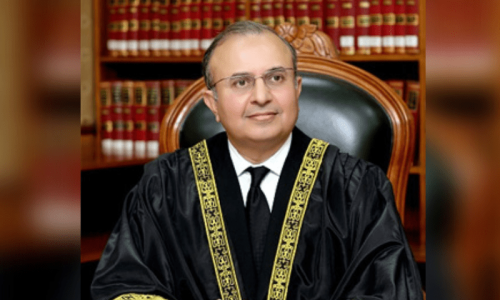Fazl mobilising religious parties to protest against military courts law

ISLAMABAD: Following the passage of the controversial 21st Constitutional Amendment by Parliament, dissenting Jamiat Ulema-i-Islam-Fazl (JUI-F) chief Maulana Fazlur Rehman has called a consultative meeting of major religious political parties on Thursday.
According to sources, the JUI-F is trying to convince the religious leaders to unite in protest against the 21st Constitutional Amendment, which was passed unanimously through Parliament on Tuesday and signed into law by the president today.
The 21st Constitutional Amendment Act and the Pakistan Army (Amendment) Act, 2015 are aimed at setting up constitutionally protected military courts to try civilian terrorism suspects.
However, leaders of the JUI-F and Jamaati-i-Islami (JI) stuck to their guns and rejected the proposed law in its current form.
Fazl had expressed his apprehensions over the new legislation, which he claimed was biased and could be used to target religious seminaries and institutions.
JUI-F officials told DawnNews today that the party chief has called leaders of religious political parties and invited them to a consultative meeting at 11am on Thursday at his Ministers' Enclave residence in Islamabad.
Religious leaders contacted by Fazl included Jamiat Ahle Hadith leader Prof Sajid Mir, Jamiat Ulema-i-Pakistan (JUP) president Dr Abul Khair Mohammad Zubair, JI chief Sirajul Haq, and leaders of the Jamiat Ulema-i-Islam Samiul Haq group (JUI-S) and the Tanzeem-e-Islami.
Also read: Petition challenging establishment of military courts filed in SC
Also invited to the meeting tomorrow are representatives of the Ittehad Tanzeem ul Madaris Pakistan (ITMP), a council consisting of the heads of the five major federations of seminaries, who have also called a separate meeting on Thursday to deliberate on their own course of action.
Speaking at a press conference on Tuesday, Fazl said that terrorism should not be linked to religion. He warned that if religious institutions are targeted in the name of terrorism under the new law, it would create controversy and distract the nation from its real target of curbing the menace of militancy and terrorism.
Meanwhile, a petition was filed in the Supreme Court today challenging the establishment of military courts. The petition states that the contentious amendment to establish military courts in the country is against the basic structure of the Constitution.








































